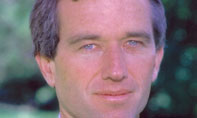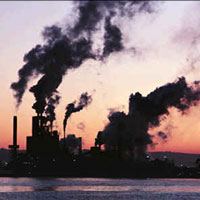- About Us
- Columns
- Letters
- Cartoons
- The Udder Limits
- Archives
- Ezy Reading Archive
- 2024 Cud Archives
- 2023 Cud Archives
- 2022 Cud Archives
- 2021 Cud Archives
- 2020 Cud Archives
- 2015-2019
- 2010-2014
- 2004-2009
 |
Ezy Reading: The Green Message Gone Missing |
While much of America turned their attention this weekend to further endless coverage of cable news reporters standing in heavy rain and wind making powerful determinations that 'this weather is ferocious', Robert F. Kennedy Jr. addressed an issue close to his heart, the environment. And he didn't pull any punches. Speaking on Friday at Unity College's 40th anniversary celebrations here in Maine, Kennedy called the Bush administration 'the worst environmental White House we've had in American history, bar none.'
 Recently Kennedy courted controversy when he declared in a blog on HuffintonPost.com that Mississippi Governor Haley Barbour as well as President Bush held some degree of responsibility for Hurricane Katrina given both leaders' roles in dismissing issues of global warming and U.S participation in the Kyoto Protocol. While asserting a direct connection between failing to sign Kyoto and Hurricane Katrina emerging in the Gulf Coast is questionable, Kennedy still made an important point about how the current administration has consistently and clearly placed environmental issues on a low-priority.
Recently Kennedy courted controversy when he declared in a blog on HuffintonPost.com that Mississippi Governor Haley Barbour as well as President Bush held some degree of responsibility for Hurricane Katrina given both leaders' roles in dismissing issues of global warming and U.S participation in the Kyoto Protocol. While asserting a direct connection between failing to sign Kyoto and Hurricane Katrina emerging in the Gulf Coast is questionable, Kennedy still made an important point about how the current administration has consistently and clearly placed environmental issues on a low-priority.
Kennedy, aligned with several environmental alliances but perhaps most prominently the Hudson Riverkeeper organization which works on improving water quality in New York's Hudson River, referred to the prevailing government's concession of environmental concerns to corporate and other interests as 'deficit spending' that would leave future administrations and generations to 'pay for our joy ride'. Specifically, he cited the Clinton administration's establishment of new rules regarding the restriction of mercury levels, and their direction to the Justice Department to pursue the 75 worst offending plants in America for excessive pollution. Both the rules and the lawsuits were scrapped with Bush in office, and the over $100 million in related industry corporate donations made to his successive Presidential campaigns have to be considered key in such developments. Indeed as Kennedy pointed out, some of those corporate donors were the same still under indictment from the previous administration for environmental misdeeds. The year he was first elected, Bush also famously appointed an oil and mining lobbyist as deputy secretary of the Interior, thus placing an individual arguably connected to the creation of pollution in a position directly related to regulation of that pollution.
But Kennedy also pointed blame at what he cited as an ineffective media, one that fails to regularly report on environmental issues and, when it does, often fails to do so accurately. In this he dismissed those who would argue that a liberal bias exists in the media, especially given the existence of an entire Fox News Network that represents conservative views, Kennedy adding in his speech that the word 'conserve' certainly held no connection to 'conservative'.
 As outspoken and inflammatory as many might consider Kennedy's position on the environment to be, most are far too quick to dismiss the issue as one worthy of our attention, even as this writer will concede that troop deaths abroad, economic hardship and local hurricane devastation would seem to be matters that demand more immediate action. That said, failure to address these issues in the short'term will, as obvious, well founded (and non'corporate funded) scientific fact tells us, cause more long term disruption, economic turmoil and death than any current crisis has the potential to fulfil.
As outspoken and inflammatory as many might consider Kennedy's position on the environment to be, most are far too quick to dismiss the issue as one worthy of our attention, even as this writer will concede that troop deaths abroad, economic hardship and local hurricane devastation would seem to be matters that demand more immediate action. That said, failure to address these issues in the short'term will, as obvious, well founded (and non'corporate funded) scientific fact tells us, cause more long term disruption, economic turmoil and death than any current crisis has the potential to fulfil.
For a comprehensive account of the Bush administration's economic track record, visit the Natural Resources Defence Council at www.nrdc.org/bushrecord
Ezy Reading is out every Monday.
